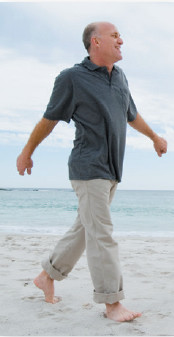Ask the doctor: Stretching before exercise
 Q. Should I stretch before or after my workout to help prevent muscle injuries and soreness? I've gotten conflicting advice on this.
Q. Should I stretch before or after my workout to help prevent muscle injuries and soreness? I've gotten conflicting advice on this.
A. We all remember the importance placed on stretching in our high school physical education classes. However, recent expert opinion has moved away from static stretching before activity and toward a gradual and active warm-up period before exercise. Stretching a healthy muscle before exercise does not prevent injury or soreness.
Muscles are made of bundles of tiny fibers. In a typical exercise-related muscle strain, these fibers develop microscopic tears. Theoretically, stretching before exercise should make the muscles more pliable and less likely to tear. But when studies have compared rates of injury or muscle soreness in people who stretch before exercise and those who don't, they have found little benefit to stretching. In fact, stretching a cold, tight muscle could lead to injury.
Instead, try a brief warm-up to get the blood flowing to your major muscle groups and loosen your joints. For example, instead of launching immediately into a brisk walk, spend five to 10 minutes taking a leisurely stroll with long strides, and then increase the pace gradually. Or when you begin exercising on a treadmill or other gym machine, start on a low setting. This will also allow your heart and muscles to respond gradually to the increased demands of exercise.
— William Kormos, M.D.
Editor in Chief, Harvard Men's Health Watch
Image: Thinkstock
Disclaimer:
As a service to our readers, Harvard Health Publishing provides access to our library of archived content. Please note the date of last review or update on all articles.
No content on this site, regardless of date, should ever be used as a substitute for direct medical advice from your doctor or other qualified clinician.















